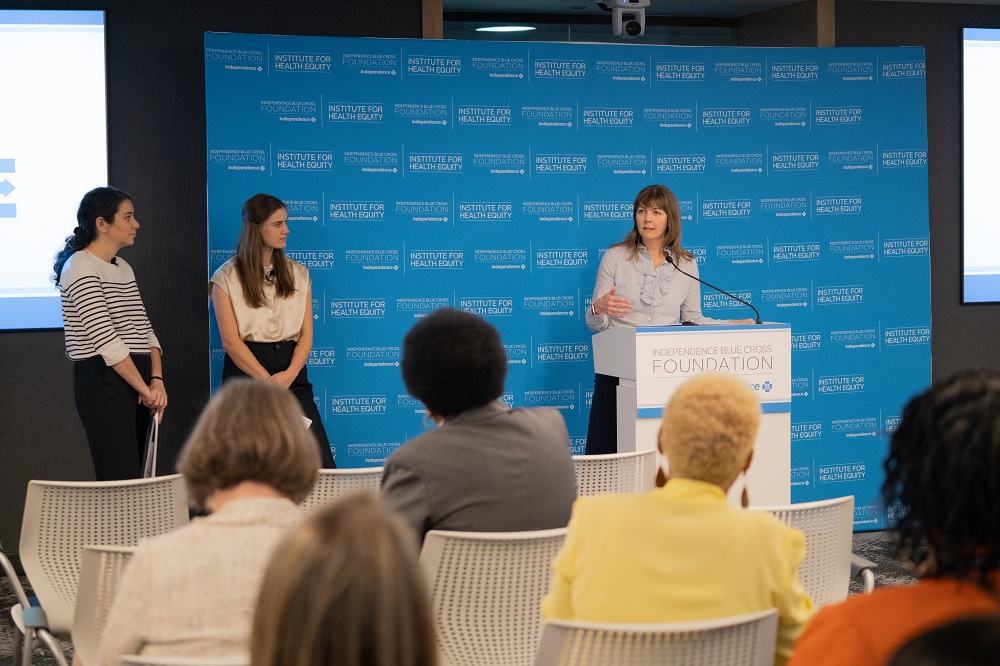During the pandemic, accessing health services digitally became much more common as patients couldn’t seek in-person healthcare.
But on the other side of the global health emergency, healthcare providers need to assess what worked and what didn’t if they’re striving for more equitable access. That healthcare equity is the focus of a partnership between the Independence Blue Cross (IBC) Foundation and the Public Good Projects (PGP).
The IBC Foundation is doing this work through its Institute for Health Equity’s five-year, $15 million pledge. The foundation hosted a health equity forum last week, with a day focused on presenting the findings of a research study on the challenges around digital health services.
Heather Major, executive director of the IBC Foundation, said the foundation focused on virtual care when it saw how it was helping to reach more people with the right level of care.
“We realized that if we allowed technology to advance as it always has, it’ll work great for some people, but it won’t work great for all people,” Major told Technical.ly. “And that will become another inequity, another system that’s inequitable, particularly for communities that have social barriers.”
Public Good Projects, a health communication nonprofit, led all of the research activities over about six months from May to November of 2022. Melissa Dunn Silesky, senior research manager at PGP, said this research had five stages.
The first was a literature review of what’s already been published about digital health in which they surveyed 500 people in the greater Philadelphia area about their experiences with it. Then the study surveyed healthcare centers supported by the IBC Foundation asking about their experience with implementing digital health resources. They also interviewed healthcare providers at those same healthcare centers and studied how social media influences what people think of digital health tools.
Major said this research will become available to the public in the next three to six months. One takeaway, though, is that there are language barrier issues with digital health services. Silesky said platforms often don’t have the language a person needs, and the translation can be more of a “Google Translate-type” which isn’t exact. She said they also found that the “help” sections of platforms are often not translated. If someone doesn’t know how to use the technology, they won’t use it, she said.
“Digital health services have a tremendous opportunity to really help improve care for some folks that are facing the greatest health inequities,” Silesky said. “But if digital health services aren’t rolled out in a thoughtful way — really thinking about how to design for the needs of our particular patients — that it can actually exacerbate those inequities.”
The foundation’s population survey showed that 75% of respondents agreed it’s easy to learn to use telehealth technology, but only 60% said they trust the technology to work. In the facility survey, they found that a lot of telehealth resources were implemented during pandemic peaks to make healthcare more accessible, but there weren’t enough training or thoughtfulness about what was implemented and why.
Since finishing this research, Silesky said her team has been presenting it to IBC Foundation’s board of directors and staff, and this past week, PGP and IBC Foundation presented the research to people from IBC Foundation-supported health centers. Major said they’ll work collaboratively with healthcare workers on how to implement changes.
Major said everyone involved agreed that for more equity, digital health services have be tailored to work for each individual situation. Before starting that work, there needs to be a solid foundation that can be customized for each center and situation.
“It’s a commitment that we’re making, both a financial one and as a priority of our work,” Major said. “And, our health centers just yesterday validated that this is important to them. It’s important to the patient population and their willingness to work with us, I think it speaks volumes to the need to make sure that we’re — at least here in our region — we’re addressing virtual care models in an equitable way.”







